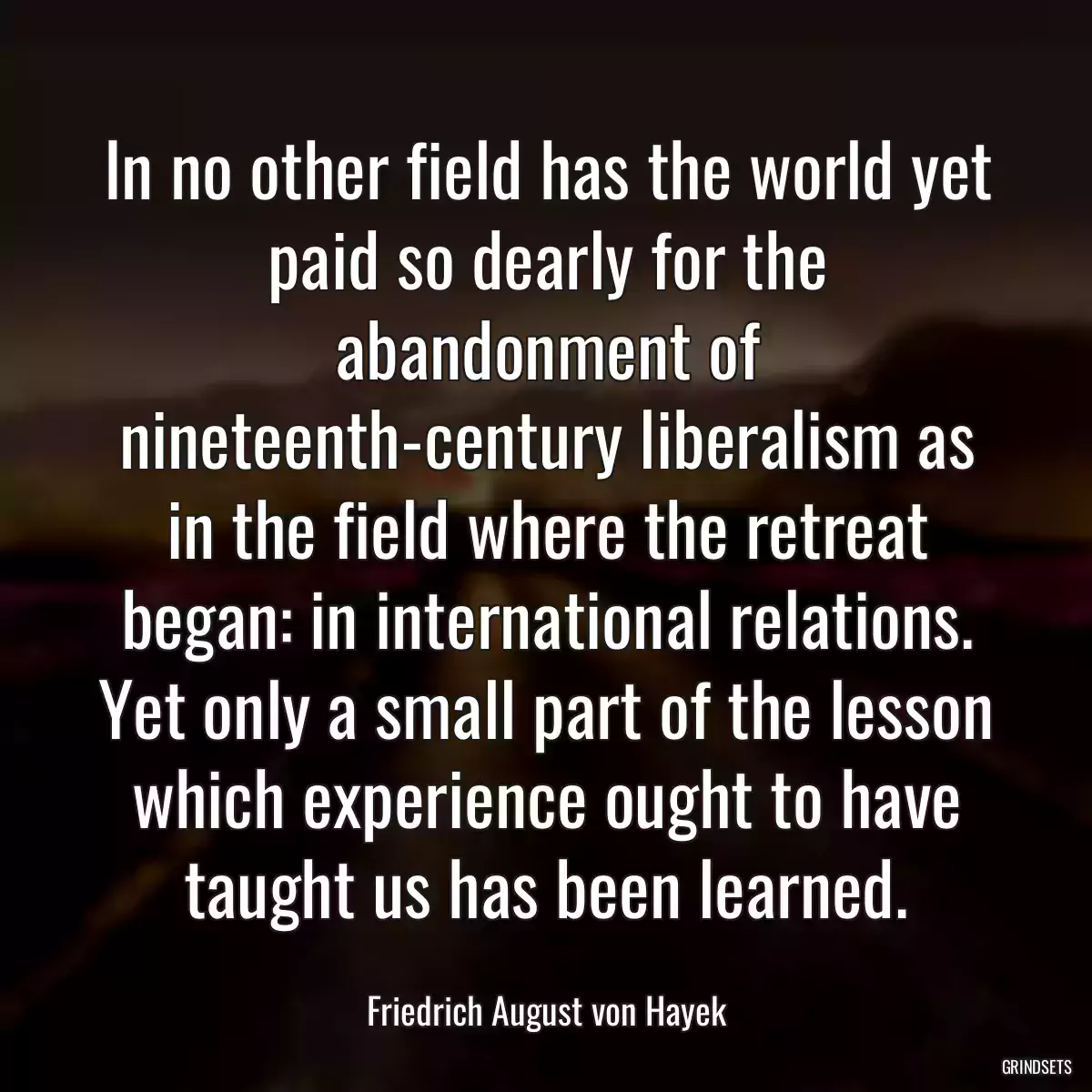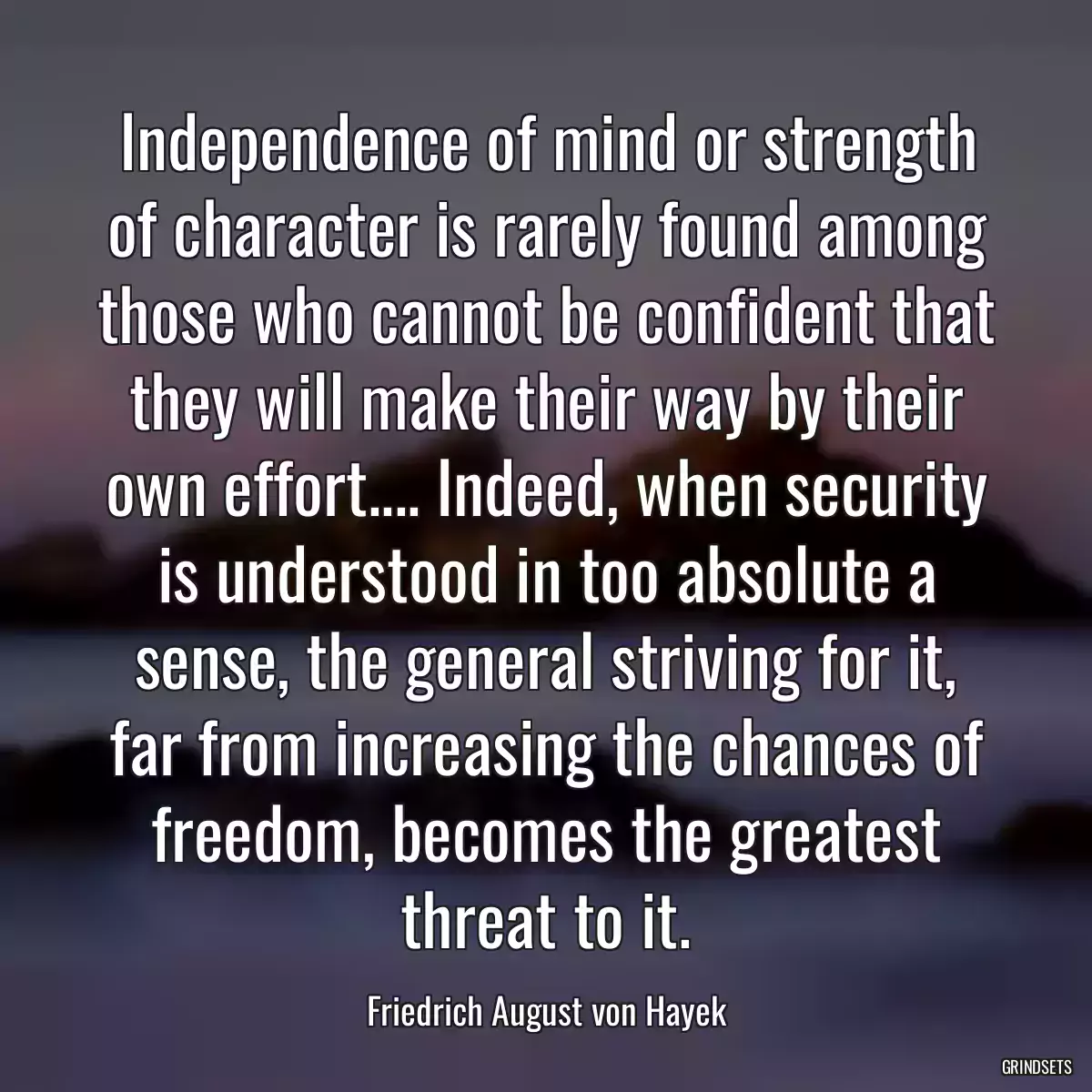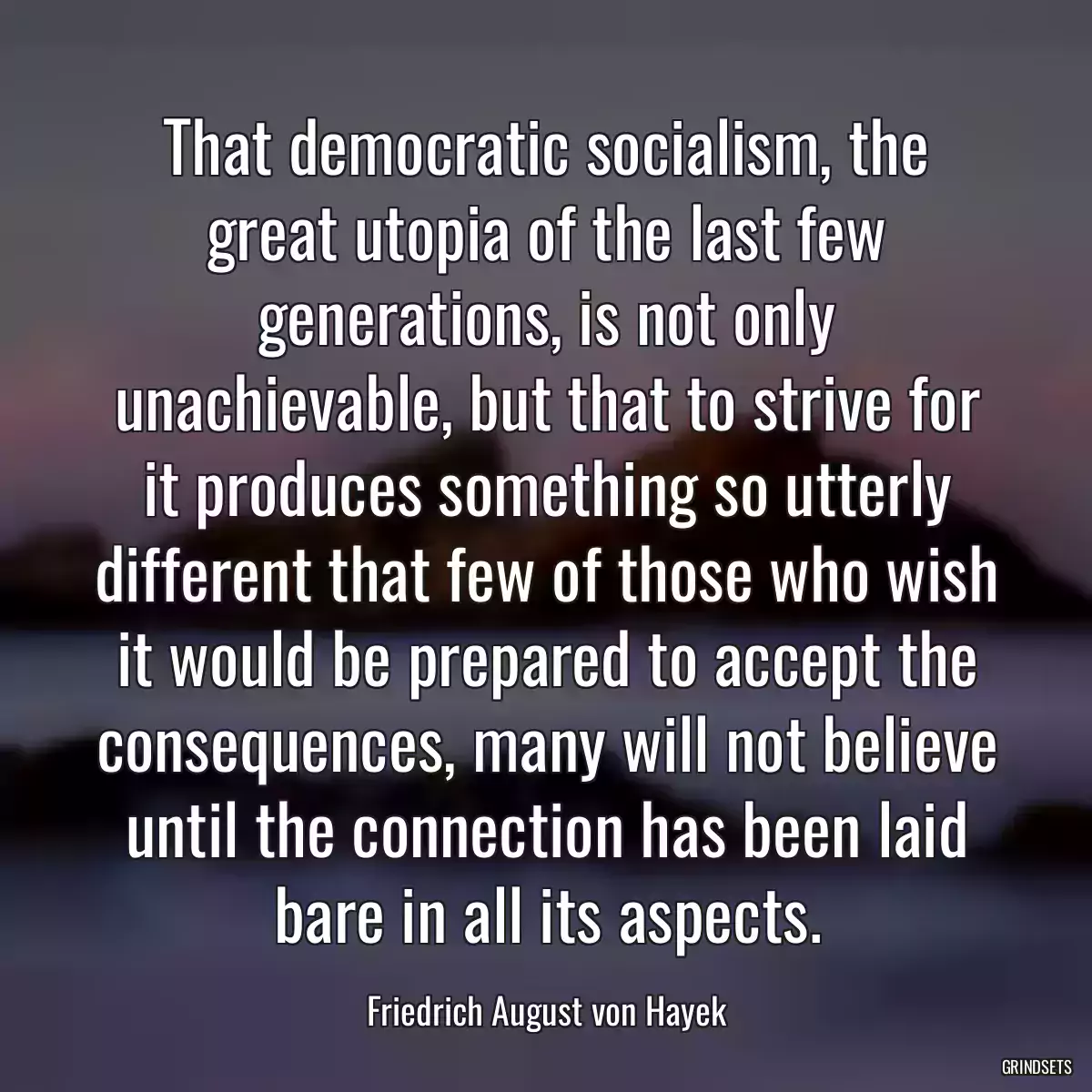
Quotes Friedrich August von Hayek
Find dozens of Friedrich August von Hayek with images to copy and share.

Many who think themselves infinitely superior to the aberrations of Nazism, and sincerely hate all manifestations, work at the same time for ideals whose realization would lead straight to the abhorred tyranny.
Our hopes of avoiding the fate which threatens must...[be to make]adjustments that will be needed if we are to recover and surpass our former standards...and only if every one of us is ready to individually obey the necessities of readjustment shall we be able to get through a difficult period as free men who can choose their own way of life. Let a uniform minimum be secured to everybody by all means; but let us admit at the same time that with this assurance of a basic minimum all claims for a privileged security for particular classes must lapse.
It is tempting to believe that social evils arise from the activities of evil men and that if only good men (like ourselves, naturally) wielded power, all would be well. That view requires only emotion and self-praise - easy to come by and satisfying as well. To understand why it is that 'good' men in positions of power will produce evil, while the ordinary man without power but able to engage in voluntary cooperation with his neighbors will produce good, requires analysis and thought, subordinating emotions to the rational.
You may also like
There can be little doubt that man owes some of his greatest successes in the past to the fact that he has not been able to control social life. His continued advance may well depend on his deliberately refraining from exercising controls which are now in his power.
Though freedom and wealth are both good things which most of us desire and though we often need both to obtain what we wish, they still remain different. Whether or not I am my own master and can follow my own choice and whether the possibilities from which I must choose are many or few are two entirely different questions. The courtier living in the lap of luxury but at the beck and call of his prince may be much less free than a poor peasant or artisan, less able to live his own life and to choose his own opportunities for usefulness.
Our freedom of choice in a competitive society rests on the fact that, if one person refuses to satisfy our wishes, we can turn to another. But if we face a monopolist we are at his absolute mercy. And an authority directing the whole economic system of the country would be the most powerful monopolist conceivable…it would have complete power to decide what we are to be given and on what terms. It would not only decide what commodities and services were to be available and in what quantities; it would be able to direct their distributions between persons to any degree it liked.
What a free society offers to the individual is much more than what he would be able to do if only he were free.
We must show that liberty is not merely one particular value but that it is the source and condition of most moral values. What a free society offers to the individual is much more than what he would be able to do if only he were free. We can therefore not fully appreciate the value of freedom until we know how a society of free men as a whole differs from one in which unfreedom prevails.

Independence of mind or strength of character is rarely found among those who cannot be confident that they will make their way by their own effort.... Indeed, when security is understood in too absolute a sense, the general striving for it, far from increasing the chances of freedom, becomes the greatest threat to it.
There is only one '' principle that can preserve a free society: namely, the strict prevention of all coercion except in the enforcement of general abstract rules equally applicable to all.
The conservatives have already accepted a large part of the collectivist creed-a creed that has governed policy for so long that many of its institutions have come to be accepted as a matter of course and have become a source of pride to "conservative" parties who created them. Here the believer in freedom cannot but conflict with the conservative and take an essentially radical position, directed against popular prejudices, entrenched positions, and firmly established privileges. Follies and abuses are no better for having long been established principles of folly.
We shall never prevent the abuse of power if we are not prepared to limit power in a way which occasionally may prevent its use for desirable purposes.
It seems to me that socialists today can preserve their position in academic economics merely by the pretense that the differences are entirely moral questions about which science cannot decide.
The discussions of every age are filled with the issues on which its leading schools of thought differ. But the general intellectual atmosphere of the time is always determined by the views on which the opposing schools agree. They become the unspoken presuppositions of all thought, and common and unquestioningly accepted foundations on which all discussion proceeds.
The successful politician owes his power to the fact that he moves within the accepted framework of thought, that he thinks and talks conventionally. It would be almost a contradiction in terms for a politician to be a leader in the field of ideas. His task in a democracy is to find out what the opinions held by the largest number are, not to give currency to new opinions which may become the majority view in some distant future.
The ultimate decision about what is accepted as right and wrong will be made not by individual human wisdom but by the disappearance of the groups that have adhered to the "wrong" beliefs.
Conservatives are inclined to use the powers of government to prevent change or to limit its rate to whatever appeals to the more timid mind. In looking forward, they lack the faith in the spontaneous forces of adjustment which makes the liberal accept changes without apprehension, even though he does not know how the necessary adaptations will be brought about.
You may also like

That democratic socialism, the great utopia of the last few generations, is not only unachievable, but that to strive for it produces something so utterly different that few of those who wish it would be prepared to accept the consequences, many will not believe until the connection has been laid bare in all its aspects.
Humiliating to human pride as it may be, we must recognize that the advance and even the preservation of civilization are dependent upon a maximum of opportunity for accidents to happen.